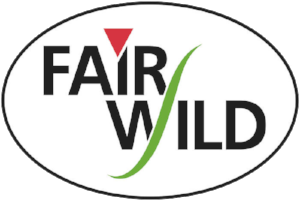FairWild @ Biofach 2018: Why wild matters
Nuremburg, Germany, 14–17th February 2018—The FairWild Foundation once again attended BioFach, the world’s largest organic trade fair, to showcase how their best-practice standards and certification scheme provide a unique opportunity to create a win-win situation for human development and the conservation of nature.
BioFach is a key annual event for all those involved in the trade of organic and wild plant ingredients and attracts producers, manufacturers, traders, brokers, NGOs, standard-setters and certifiers from the world over. FairWild Foundation was among the 3,218 exhibitors from a total of 93 countries. FairWild exhibited at the “Organic Africa Pavilion”, meeting with new and existing stakeholders to discuss the benefits that derive from sustainable trade of wild plant ingredients.
FairWild event: Meeting Development and Sustainability Goals with the FairWild Standard
On 15th February, FairWild hosted an event "Why wild matters: Achieving Development and Sustainability impacts with the FairWild Standard" which introduced the FairWild Standard for wild plants as a means to achieve development goals and global commitments on biodiversity conservation, while at the same time contributing to meeting sustainability principles of the private sector. Attended by over 75 participants, it was an excellent platform to discuss FairWild developments and opportunities for further uptake.
Anastasiya Timoshyna, TRAFFIC's Medicinal and Aromatic Plants Programme Leader, presents "Why WIld Matters"The event was facilitated by Franziska Staubli, Chair of the FairWild Board of Trustees and Sustainability Manager at MIGROS and included guest speakers from the FairWild Foundation, herbal products industry and development aid institutions.
Anastasiya Timoshyna from TRAFFIC set the scene with a presentation of how FairWild Standard could directly support the implementation the UN Sustainable Development Goals, noting that “The implementation of the FairWild Standard directly supports the delivery of several SDGs, including on sustainable use of biodiversity and providing practical measures to reduce poverty”.
Sebastian Pole, co-founder of Pukka Herbs, in the follow-up presentation, explained the role that FairWild plays in demonstrating tangible commitment to traceable and sustainable wild-sourcing for his company. He illustrated this by sharing the inspirational conservation success story of the Bibhitaki Tree and the Great Pied Hornbill. A joint FairWild project with Applied Environmental Research Foundation and other partners helped in the conservation of these charismatic species whilst also providing development opportunities for local harvesting communities. 600 large Bibhitaki trees have been saved in the project to date, protecting over 30 hornbills nesting sites, and creating sustainable livelihood opportunities for over 100 collectors.
Muhammad Zahid Durrani, from Hunza Organics Pakistan, producer of wild plant ingredients, provided insights into the impacts that FairWild implementation had on his company’s operation in Northern areas of Pakistan, including greater social cohesion, increased participation and uplifting the role of women, as well as structured approach to ensuring sustainability.
Patrick Läderach of the Swiss State Secretariat for Economic Affairs made an argument following this set of presentations of why investment in initiatives like FairWild is key for ensuring development targets.
To initiate the discussion about the impacts of the FairWild initiative to date, Steven Broad, the FairWild Foundation Trustee and the Executive Director of TRAFFIC provided an overview of the recent FairWild development and the Foundation’s plans for 2018.
At the post-talk reception on the Organic Africa Pavilion, participants had the chance to enjoy FairWild-labelled Juniper Green London Dry Gin served with organic tonic.
10 years of FairWild
2018 marks the 10-year founding anniversary of FairWild. Currently over 400 tons of certified ingredients are traded annually and more than 50 products with FairWild-certified ingredients are sold in 30 countries. This demonstrates the steady progress towards FairWild’s mission ’to enable the transformation of resource management and business practices to be ecologically, socially and economically sustainable throughout the supply chain of wild-collected products.’
New developments and their results
The FairWild Foundation is constantly increasing the user-friendliness of its scheme whilst maintaining its unparalleled strong standards. This includes undertaking the internal review of the FairWild Standard, as well as supporting the training and capacity-building events on FairWild.
The new accreditation system launched last year is already showing significant results, with three additional control bodies having been accredited and implementing auditor training programmes in Pakistan, Bulgaria and China. All of them are now ready or have already started to successfully certify producers worldwide (follow this link for the most up-to-date list of the FairWild approved control bodies).
FairWild Foundation partner ProFound – Advisers in Development, presented the NI-Check App (Natural Ingredients-Check Application), a tool for the (wild collected) natural ingredients value chain. This tool can help reduce the number of documents required for demonstrating the compliance with multiple certification schemes often requested by buyers, including the FairWild Standard.
FairWild attempts to increase the outreach of its work through its industry partners, to grow the awareness of the sustainability of wild plants harvesting and the FairWild label. The inaugural FairWild week took place in August 2017, creating the campaign to promote FairWild and the responsible use of wild ingredients to consumers and companies. Plans are made for the 2018 FairWild week, to be held between 25 June-2 July 2018, and FairWild invites everyone to engage!
Acknowledgements
The FairWild participation at BioFach was supported by Friends of FairWild donations, in-kind donations from licensees and partner organizations, including TRAFFIC and ProFound – Advisers in Development, through connections with a number of projects worldwide that draw on the FairWild Standard as a sustainability framework. These projects include LENA project in Europe’s Danube region to strengthen joint and integrated approaches and policies for the conservation and sustainable use of protected areas.

